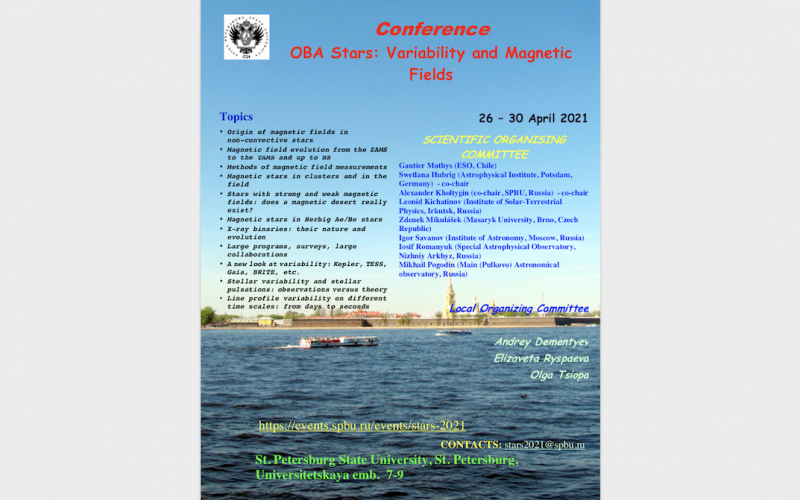The conference “OBA Stars: Variability and Magnetic Fields” is planned to be organized in Saint-Petersburg University, Russia on 26-30 April, 2021.
Scientific Rationale
The conference will be devoted to studies of early-type OBA stars, their magnetic fields and variability. Massive O and B stars are of particular interest, as they end their evolution with a supernova explosion, producing neutron stars or black holes and drive the evolution of star forming galaxies at all redshifts. The conference will focus on stellar magnetic fields, their origin, evolution and their impact on stellar evolution. The other important issue to be discussed at the conference is the variability of massive stars. The analysis of variability is a powerful tool to study the stellar structure, the stellar environment, and the stellar evolution.
Further topics included in the conference program are:
- Origin of magnetic fields in non-convective stars
- Magnetic field evolution from the ZAMS to the TAMS and up to NS
- Methods of magnetic field measurements
- Magnetic stars in clusters and in the field
- Stars with strong and weak magnetic fields: does a magnetic desert really exist?
- Magnetic fields in Herbig Ae/Be stars
- X-ray binaries: their nature and evolution
- Large programs, surveys, large collaborations
- A new look at variability: Kepler, TESS, Gaia, BRITE, etc.
- Stellar variability and stellar pulsations: observations versus theory
- Line profile variability on different time scales: from days to seconds
Scientific Organizing Committee:
- Gautier Mathys (ESO, Chile)
- Swetlana Hubrig (Leibniz Institute for Astrophysics Potsdam (AIP), Germany) – co-chair
- Alexander Kholtygin (Saint-Petersburg University, Saint-Petersburg, Russia) – co-chair
- Leonid Kichatinov (Institute of Solar-Terrestrial Physics, Irkutsk, Russia)
- Zdenek Mikulasek (Masaryk University, Brno, Czech Republic)
- Igor Savanov (Institute of Astronomy, Moscow, Russia)
- Iosif Romanyuk (Special Astrophysical Observatory, Nizhnij Arkhyz, Russia)
- Mikhail Pogodin (Main (Pulkovo) Astronomical Observatory, Russia)
More details will be given in the second announcement.
